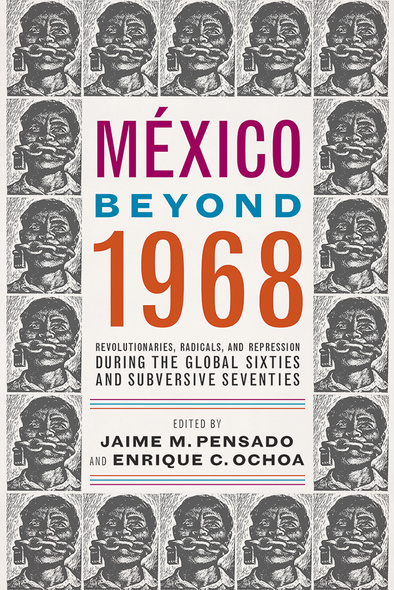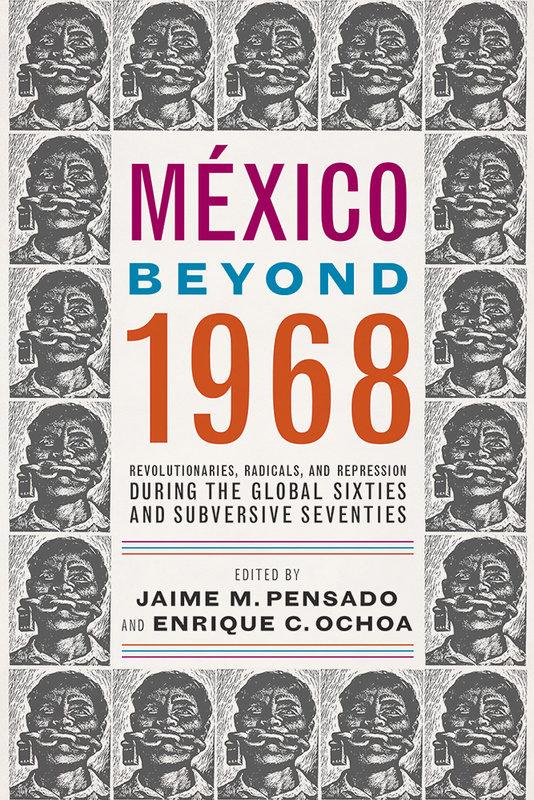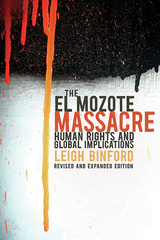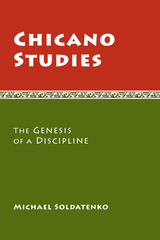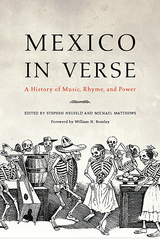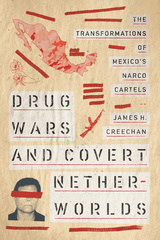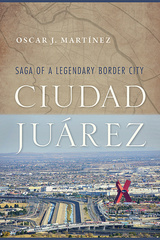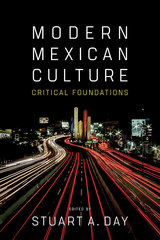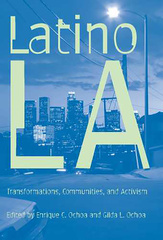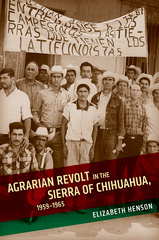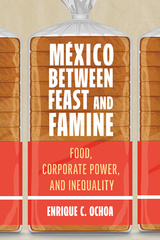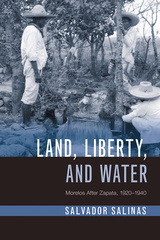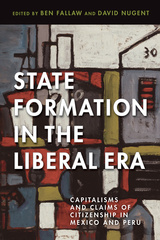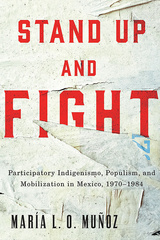México Beyond 1968
Revolutionaries, Radicals, and Repression During the Global Sixties and Subversive Seventies
Edited by Jaime M. Pensado and Enrique C. Ochoa
The University of Arizona Press
México Beyond 1968 examines the revolutionary organizing and state repression that characterized Mexico during the 1960s and 1970s. The massacre of students in Mexico City in October 1968 is often considered the defining moment of this period. The authors in this volume challenge the centrality of that moment by looking at the broader story of struggle and repression across Mexico during this time. México Beyond 1968 complicates traditional narratives of youth radicalism and places urban and rural rebellions within the political context of the nation’s Dirty Wars during this period.
The book illustrates how expressions of resistance developed from the ground up in different regions of Mexico, including Chihuahua, Guerrero, Jalisco, Mexico City, Puebla, and Nuevo León. Movements in these regions took on a variety of forms, including militant strikes, land invasions, cross-country marches, independent forums, popular organizing, and urban and rural guerrilla uprisings.
México Beyond 1968 brings together leading scholars of Mexican studies today. They share their original research from Mexican archives partially opened after 2000 and now closed again to scholars, and they offer analysis of this rich primary source material, including interviews, political manifestos, newspapers, and human rights reports.
By centering on movements throughout Mexico, México Beyond 1968 underscores the deep-rooted histories of inequality and the frustrations with a regime that monopolized power for decades. It challenges the conception of the Mexican state as “exceptional” and underscores and refocuses the centrality of the 1968 student movement. It brings to light the documents and voices of those who fought repression with revolution and asks us to rethink Mexico’s place in tumultuous times.
Contributors:
Alexander Aviña
Adela Cedillo
A. S. Dillingham
Luis Herrán Avila
Fernando Herrera Calderón
The book illustrates how expressions of resistance developed from the ground up in different regions of Mexico, including Chihuahua, Guerrero, Jalisco, Mexico City, Puebla, and Nuevo León. Movements in these regions took on a variety of forms, including militant strikes, land invasions, cross-country marches, independent forums, popular organizing, and urban and rural guerrilla uprisings.
México Beyond 1968 brings together leading scholars of Mexican studies today. They share their original research from Mexican archives partially opened after 2000 and now closed again to scholars, and they offer analysis of this rich primary source material, including interviews, political manifestos, newspapers, and human rights reports.
By centering on movements throughout Mexico, México Beyond 1968 underscores the deep-rooted histories of inequality and the frustrations with a regime that monopolized power for decades. It challenges the conception of the Mexican state as “exceptional” and underscores and refocuses the centrality of the 1968 student movement. It brings to light the documents and voices of those who fought repression with revolution and asks us to rethink Mexico’s place in tumultuous times.
Contributors:
Alexander Aviña
Adela Cedillo
A. S. Dillingham
Luis Herrán Avila
Fernando Herrera Calderón
Gladys I. McCormick
Enrique C. Ochoa
Verónica Oikión Solano
Tanalís Padilla
Wil G. Pansters
Jaime M. Pensado
Gema Santamaría
Michael Soldatenko
Carla Irina Villanueva
Eric Zolov
Enrique C. Ochoa
Verónica Oikión Solano
Tanalís Padilla
Wil G. Pansters
Jaime M. Pensado
Gema Santamaría
Michael Soldatenko
Carla Irina Villanueva
Eric Zolov
México Beyond 1968 brings together some of the leading scholars engaged in rewriting Mexican history from 1940 to the 1980s, often based on original archival research. This book will make a significant contribution to how we understand contemporary Mexico.’—Miguel Tinker Salas, author of Venezuela: What Everyone Needs to Know
Jaime M. Pensado is an associate professor of history and director of the Mexico Working Group (MWG) at the University of Notre Dame. He is the author of Rebel Mexico: Student Unrest and Authoritarian Political Culture During the Long Sixties.
Enrique C. Ochoa is a professor of Latin American studies and history at California State University, Los Angeles. He is the author of Feeding Mexico: The Political Uses of Food Since 1910 and co-editor of Latino Los Angeles: Transformations, Communities, and Activism.
Enrique C. Ochoa is a professor of Latin American studies and history at California State University, Los Angeles. He is the author of Feeding Mexico: The Political Uses of Food Since 1910 and co-editor of Latino Los Angeles: Transformations, Communities, and Activism.
Preface: Mexico Today
Jaime M. Pensado and Enrique C. Ochoa
Acknowledgments
Introduction: México Beyond 1968: Revolutionaries, Radicals, and Repression
Jaime M. Pensado and Enrique C. Ochoa
PART I. INTRODUCTORY ESSAYS
1. Integrating Mexico into the Global Sixties
Eric Zolov
2. Zones and Languages of State-Making: From Pax Priísta to Dirty War
Wil G. Pansters
PART II. REVOLUTIONARY ORGANIZING AND STATE RESPONSE
3. “Latent Sites of Agitation”: Normalistas Rurales and Chihuahua’s Agrarian Struggle in the 1960s
Tanalís Padilla
4. “For the Liberation of Exploited Youth”: Campesino-Students, the FECSM, and Mexican Student Politics in the 1960s
Carla Irina Villanueva
5. The 23rd of September Communist League’s Foco Experiment in the Sierra Baja Tarahumara (1973–1975) Adela Cedillo
6. Mexico’s Turn Toward the Third World: Rural Development Under President Luis Echeverría
A. S. Dillingham
7. A War Against Poor People: Dirty Wars and Drug Wars in 1970s Mexico
Alexander Aviña
PART III. YOUTH RADICALISMS AND STATE VIOLENCE
8. Working-Class Heroes: Barrio Consciousness, Student Power, and the Mexican Dirty War
Fernando Herrera Calderón
9. The Various Lives of Mexican Maoism: Política Popular, a Mexican Social Maoist Praxis
Michael Soldatenko
10. The Other “New Man”: Conservative Nationalism and Right-Wing Youth in 1970s Monterrey
Luis Herrán Avila
11. “The Darkest and Most Shameful Page in the University’s History”: Mobs, Riots, and Student Violence in 1960s–1970s Puebla
Gema Santamaría
12. Student Organizing in Post-1968 Mexico City: The Coordinating Commission of the Committees of Struggle and State Violence
Verónica Oikión Solano
13. Torture and the Making of a Subversive During Mexico’s Dirty War
Gladys I. McCormick
Final Remarks: Toward a Provincialization of 1968
Jaime M. Pensado and Enrique C. Ochoa
Chronology of Selected Events: Revolutionaries, Radicals, and Repression (c. 1946–c. 1980)
List of Abbreviations
Contributors
Index
Jaime M. Pensado and Enrique C. Ochoa
Acknowledgments
Introduction: México Beyond 1968: Revolutionaries, Radicals, and Repression
Jaime M. Pensado and Enrique C. Ochoa
PART I. INTRODUCTORY ESSAYS
1. Integrating Mexico into the Global Sixties
Eric Zolov
2. Zones and Languages of State-Making: From Pax Priísta to Dirty War
Wil G. Pansters
PART II. REVOLUTIONARY ORGANIZING AND STATE RESPONSE
3. “Latent Sites of Agitation”: Normalistas Rurales and Chihuahua’s Agrarian Struggle in the 1960s
Tanalís Padilla
4. “For the Liberation of Exploited Youth”: Campesino-Students, the FECSM, and Mexican Student Politics in the 1960s
Carla Irina Villanueva
5. The 23rd of September Communist League’s Foco Experiment in the Sierra Baja Tarahumara (1973–1975) Adela Cedillo
6. Mexico’s Turn Toward the Third World: Rural Development Under President Luis Echeverría
A. S. Dillingham
7. A War Against Poor People: Dirty Wars and Drug Wars in 1970s Mexico
Alexander Aviña
PART III. YOUTH RADICALISMS AND STATE VIOLENCE
8. Working-Class Heroes: Barrio Consciousness, Student Power, and the Mexican Dirty War
Fernando Herrera Calderón
9. The Various Lives of Mexican Maoism: Política Popular, a Mexican Social Maoist Praxis
Michael Soldatenko
10. The Other “New Man”: Conservative Nationalism and Right-Wing Youth in 1970s Monterrey
Luis Herrán Avila
11. “The Darkest and Most Shameful Page in the University’s History”: Mobs, Riots, and Student Violence in 1960s–1970s Puebla
Gema Santamaría
12. Student Organizing in Post-1968 Mexico City: The Coordinating Commission of the Committees of Struggle and State Violence
Verónica Oikión Solano
13. Torture and the Making of a Subversive During Mexico’s Dirty War
Gladys I. McCormick
Final Remarks: Toward a Provincialization of 1968
Jaime M. Pensado and Enrique C. Ochoa
Chronology of Selected Events: Revolutionaries, Radicals, and Repression (c. 1946–c. 1980)
List of Abbreviations
Contributors
Index

